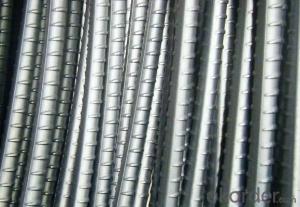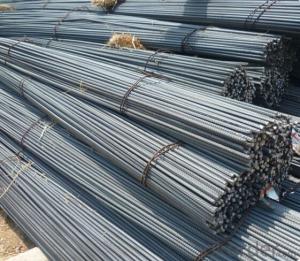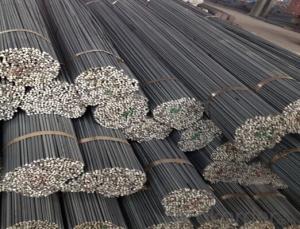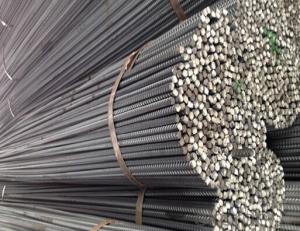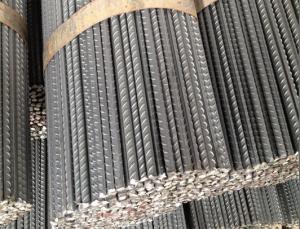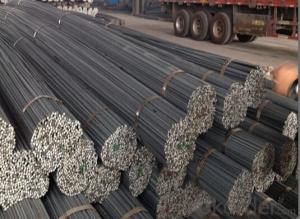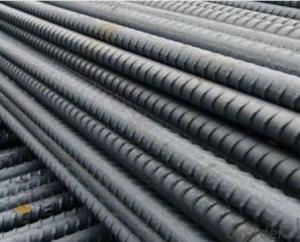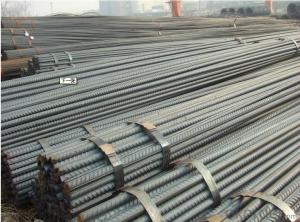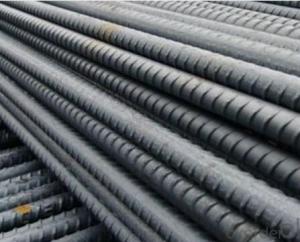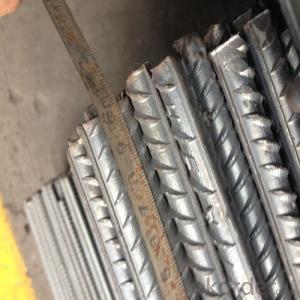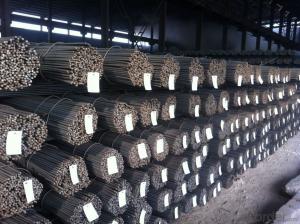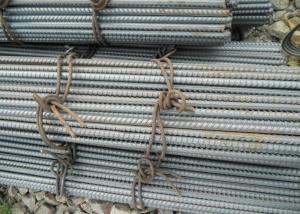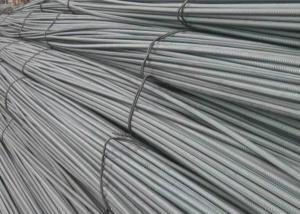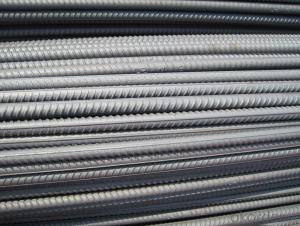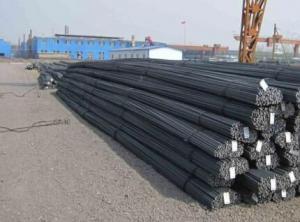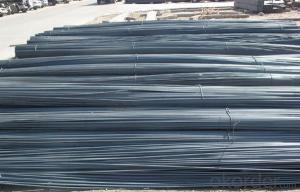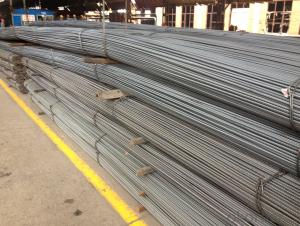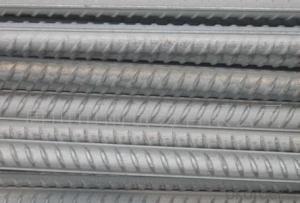Turkish Ukraine HRB400 Dia.16mm Deformed Reinforcement rebar with Price per Ton
- Loading Port:
- Tianjin
- Payment Terms:
- TT OR LC
- Min Order Qty:
- 100 m.t.
- Supply Capability:
- 10000 m.t./month
OKorder Service Pledge
Quality Product, Order Online Tracking, Timely Delivery
OKorder Financial Service
Credit Rating, Credit Services, Credit Purchasing
You Might Also Like
Item specifice
Standard:
AISI,ASTM,JIS,GB,BS,DIN,API,EN
Technique:
Hot Rolled,Cold Rolled,Cold Drawn,ERW,Forged,Saw,Extruded,EFW,Spring
Shape:
U Channel,Square,C Channel,Hexagonal,Round,Rectangular,Oval,LTZ
Surface Treatment:
Galvanized,Coated,Copper Coated,Color Coated,Oiled,Dry,Chromed Passivation,Polished,Bright,Black,PVDF Coated
Steel Grade:
Q195,Q215,Q235,Q215B,Q235B,RHB335,HRB400,200 Series,300 Series,400 Series,600 Series,SS400-SS490,10#,20#,A53(A,B)
Certification:
ISO,SGS,BV,IBR,RoHS,CE,API,BSI,UL
Thickness:
6-34mm
Width:
6-34mm
Length:
12m
Outer Diameter:
6-34mm
Net Weight:
10kg
Packaging:
seaworthy packaging
Turkish Ukraine HRB400 Dia.16mm Deformed Reinforcement rebar with Price per Ton
Details of the Turkish Ukraine HRB400 Dia.16mm Deformed Reinforcement rebar with Price per Ton
| Standard & Grade: | GB1499-98 : HRB335,HRB400,HRB500 |
| BS4449-1997 : GR460,GR500 | |
| CAN/CSA-G30.18-M92 : 400W | |
| ASTM A615 : Gr.40, Gr.60 | |
| Diameter: | 6mm;8mm;10mm;12mm;14mm;16mm;18mm;20mm;22mm;25mm;28mm;30mm;32mm;35mm;40mm |
| Length: | 6m,9m,12m |
| Packing: | Bundle packing |
| Origin: | China |
| Application: | Construction,Road,Machinery processing,Welding fields. |
| Delivery time: | 10-25 days |
| Shipment: | By bulk vessel or Container |
| Documents: | Mill Test Certificate,Commercial Invoice,Packing List,Certificate of Origin |
Company Introduction of the Turkish Ukraine HRB400 Dia.16mm Deformed Reinforcement rebar with Price per Ton
CNBM International Corporation is the most import and export platform of CNBM group(China National Building Material Group Corporation) ,which is a state-owned enterprise, ranked in 270th of Fortune Global 500 in 2015.
With its advantages, CNBM International are mainly concentrate on Cement, Glass, Iron and Steel, Ceramics industries and devotes herself for supplying high quality series of refractories as well as technical consultancies and logistics solution.
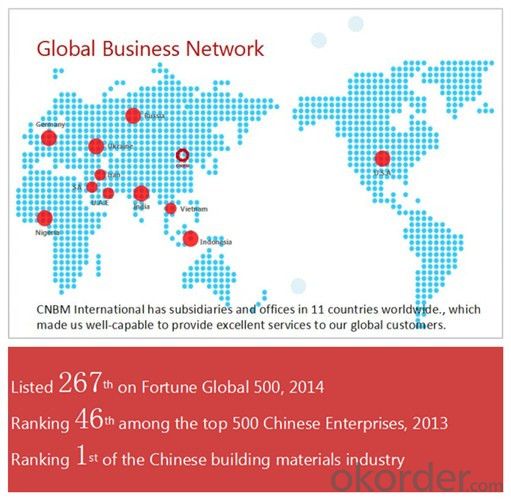
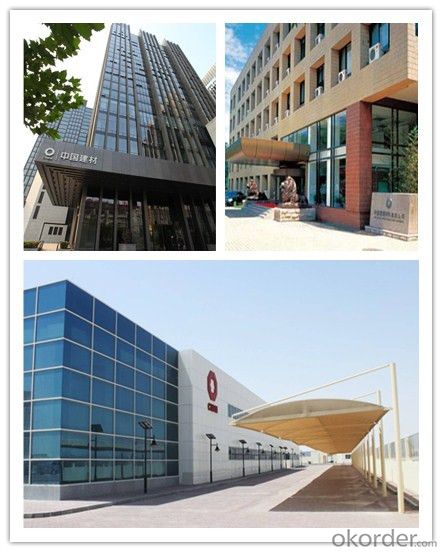
Packaging & Delivery of the Turkish Ukraine HRB400 Dia.16mm Deformed Reinforcement rebar with Price per Ton
| Packaging Detail | Sea worthy packing /as per customer's packing instruction |
| Delivery Detail | 15 ~ 40 days after receiving the deposit |
FAQ
| Are you a trading company or manufacturer? | Manufacturer |
| What’s the MOQ? | 1000m2 |
| What’s your delivery time? | 15-20 days after downpayment received |
| Do you Accept OEM service? | Yes |
| what’s your delivery terms? | FOB/CFR/CIF |
| What's the Payment Terms? | 30% as deposit,70% before shipment by T/T |
| Western Union acceptable for small amount. | |
| L/C acceptable for large amount. | |
| Scrow ,Paybal,Alipay are also ok | |
| Why choose us? | Chose happens because of quality, then price, We can give you both. Additionally, we can also offer professional products inquiry, products knowledge train (for agents), smooth goods delivery, excellent customer solution proposals. |
| What's your available port of Shipment? | Main Port, China |
| What’s your featured services? | Our service formula: good quality+ good price+ good service=customer's trust |
| Where are your Market? | Covering more than 160 countries in the world |
- Q:Are there any specific guidelines for handling and storing steel rebars?
- Yes, there are specific guidelines for handling and storing steel rebars to ensure their quality and safety. Some of the key guidelines include: 1. Proper handling: Steel rebars should be handled with care to avoid any damage or bending. They should be lifted using appropriate equipment and not dragged or thrown. 2. Storage conditions: Rebars should be stored in a clean, dry, and well-ventilated area to prevent rusting and corrosion. They should be kept off the ground and away from moisture, chemicals, and direct sunlight. 3. Stacking: Rebars should be stacked in a way that ensures stability and prevents any deformation. They should be placed on flat surfaces and stacked in layers with wooden or rubber separators to avoid direct contact between rebars. 4. Labelling: Each bundle of rebars should be properly labeled with relevant information such as size, grade, and quantity for easy identification and inventory management. 5. Inspection: Regular inspections should be conducted to check for any signs of damage, rust, or corrosion. Damaged or corroded rebars should be discarded or repaired before use. Adhering to these guidelines is crucial to maintain the quality and integrity of steel rebars, ensuring their suitability for construction purposes.
- Q:How are steel rebars protected against alkali attacks?
- Steel rebars are protected against alkali attacks through the use of various techniques and materials. One common method is to apply a protective coating on the surface of the rebars. This coating acts as a barrier, preventing direct contact between the alkaline environment and the steel. Some commonly used coatings include epoxy, zinc, and polyethylene. These coatings are designed to be durable and provide long-term protection against alkali attacks. Another method of protection is through the use of corrosion inhibitors. These inhibitors are added to the concrete mixture during construction. They work by reducing the corrosive effects of alkali on the steel rebars. Corrosion inhibitors form a protective film on the surface of the steel, preventing the alkali from reaching the rebar and causing damage. In addition to coatings and corrosion inhibitors, proper concrete mix design can also play a significant role in protecting rebars against alkali attacks. By optimizing the composition of the concrete mix, engineers can reduce the alkalinity of the environment surrounding the rebars. This helps to minimize the risk of alkali attacks and subsequent corrosion. Regular maintenance and inspection of structures is crucial in ensuring the continued protection of steel rebars against alkali attacks. Monitoring the condition of the rebars and taking prompt action in case of any signs of corrosion or damage is essential for their long-term durability. Overall, a combination of protective coatings, corrosion inhibitors, proper concrete mix design, and regular maintenance are key factors in safeguarding steel rebars against alkali attacks. By implementing these measures, the lifespan and structural integrity of concrete structures can be significantly extended.
- Q:Can steel rebars be used in industrial flooring?
- Yes, steel rebars can be used in industrial flooring. Steel rebars provide added strength and reinforcement to concrete structures, making them suitable for heavy-duty applications such as industrial flooring. The rebars are typically embedded within the concrete to increase its load-bearing capacity and prevent cracking or structural failure.
- Q:How are steel rebars stored on-site?
- Steel rebars are typically stored on-site in a designated area that is clean, dry, and well-ventilated. They are usually stacked horizontally and separated by wooden blocks or spacers to prevent them from touching the ground or each other. Additionally, rebars may be covered with a tarp or protective sheeting to shield them from moisture and dirt. Overall, proper storage of steel rebars ensures easy access, protects their integrity, and promotes safety on the construction site.
- Q:Why can't grounding steel be used?
- When the thread steel is grounded, the contact with the soil is not dense, and the grounding resistance value is increased
- Q:How do steel rebars contribute to the durability of a structure?
- Steel rebars contribute to the durability of a structure by providing reinforcement and strength to concrete. They help to prevent cracking and structural failure by absorbing and distributing tensile forces, enhancing the overall structural integrity and resilience. Additionally, steel rebars offer resistance to corrosion, ensuring the longevity and durability of the structure.
- Q:How do steel rebars contribute to the load-bearing capacity of concrete slabs?
- Steel rebars contribute to the load-bearing capacity of concrete slabs in several ways. Firstly, they enhance the tensile strength of the concrete. Concrete is known for its compressive strength, but it lacks the ability to withstand tensile forces. By placing steel rebars within the concrete, it forms a reinforced structure that can resist both compressive and tensile stresses. This prevents the concrete from cracking or failing under heavy loads. Secondly, steel rebars help to distribute the load more evenly across the concrete slab. When a load is applied to a concrete slab, it tends to concentrate at certain points, causing stress concentrations. The presence of rebars helps to spread the load over a larger area, reducing the stress on any individual point and improving the overall load-bearing capacity of the slab. Moreover, steel rebars also prevent the propagation of cracks in concrete slabs. If a crack occurs in the concrete, the rebars act as reinforcement and hold the cracked sections together, preventing the crack from expanding further. This helps to maintain the structural integrity of the slab and ensures its load-bearing capacity is not compromised. In summary, steel rebars play a crucial role in enhancing the load-bearing capacity of concrete slabs by providing tensile strength, distributing loads more evenly, and preventing crack propagation. Their inclusion in concrete structures significantly improves their durability and ability to withstand heavy loads, making them essential components in construction projects.
- Q:Can steel rebars be used in structures subjected to chemical exposure?
- Steel rebars can be used in structures subjected to chemical exposure, but their suitability depends on the specific type and concentration of chemicals involved. In general, stainless steel rebars or epoxy-coated rebars are preferred for such applications as they provide better resistance to corrosion and chemical attack compared to plain carbon steel rebars. However, it is important to conduct a thorough evaluation of the chemical environment and consult with experts to determine the most appropriate rebar material for the specific structure and its intended use.
- Q:What are the different corrosion protection methods for steel rebars?
- There are several corrosion protection methods available for steel rebars, which are commonly used in reinforced concrete structures. These methods aim to prevent or minimize the corrosion of the steel rebars, as corrosion can significantly weaken the overall structure. 1. Concrete Cover: The most common corrosion protection method is providing an adequate thickness of concrete cover over the steel rebars. The concrete acts as a physical barrier, preventing exposure of the rebars to corrosive elements. 2. Galvanization: Galvanizing involves coating the steel rebars with a layer of zinc. This protective layer acts as a sacrificial anode, corroding before the steel rebars. Galvanization significantly enhances the rebars' resistance to corrosion. 3. Epoxy Coating: Epoxy coating is a popular corrosion protection method where a layer of epoxy resin is applied over the steel rebars. The epoxy acts as a barrier, preventing moisture and corrosive substances from reaching the rebars. 4. Cathodic Protection: Cathodic protection is an electrochemical method that involves the application of a sacrificial anode or an impressed current system. In a sacrificial anode system, a more reactive metal, such as zinc or magnesium, is connected to the steel rebars, sacrificing itself and preventing corrosion. In an impressed current system, an external power source is used to provide a protective current to the rebars, preventing corrosion. 5. Corrosion Inhibitors: Corrosion inhibitors are chemicals added to the concrete mix or applied as a surface treatment to the rebars. These inhibitors form a protective film on the rebars' surface, preventing corrosion by blocking the access of corrosive agents. 6. Stainless Steel Rebars: Using stainless steel rebars is an effective corrosion protection method. Stainless steel has a high resistance to corrosion, making it suitable for structures exposed to aggressive environments. It is important to note that the selection of the appropriate corrosion protection method depends on various factors, including the environmental conditions, expected service life of the structure, and cost considerations. Additionally, regular inspection and maintenance of the corrosion protection system are essential to ensure its effectiveness over time.
- Q:Can steel rebars be used in structures with limited construction expertise?
- Although limited construction expertise is sufficient for using steel rebars in structures, it is crucial to adhere to proper guidelines and possess a fundamental understanding of construction principles. Rebars are commonly employed to enhance the strength and durability of concrete structures. However, their accurate placement and installation play a pivotal role in guaranteeing the structural integrity of the building. While it is feasible to utilize steel rebars without extensive construction expertise, it is highly advisable to seek guidance from a professional engineer or a qualified construction expert. They can offer valuable insights regarding the suitable positioning, size, and spacing of rebars, as well as the necessary concrete mix design and curing techniques. Furthermore, it is essential to comply with local building codes and regulations, as they stipulate the minimum standards for structural safety. These codes frequently include specific requirements for the utilization of rebars in construction. By adhering to these guidelines and seeking professional advice, even individuals with limited construction expertise can effectively employ steel rebars and ensure the structural stability of their buildings.
1. Manufacturer Overview |
|
|---|---|
| Location | |
| Year Established | |
| Annual Output Value | |
| Main Markets | |
| Company Certifications | |
2. Manufacturer Certificates |
|
|---|---|
| a) Certification Name | |
| Range | |
| Reference | |
| Validity Period | |
3. Manufacturer Capability |
|
|---|---|
| a)Trade Capacity | |
| Nearest Port | |
| Export Percentage | |
| No.of Employees in Trade Department | |
| Language Spoken: | |
| b)Factory Information | |
| Factory Size: | |
| No. of Production Lines | |
| Contract Manufacturing | |
| Product Price Range | |
Send your message to us
Turkish Ukraine HRB400 Dia.16mm Deformed Reinforcement rebar with Price per Ton
- Loading Port:
- Tianjin
- Payment Terms:
- TT OR LC
- Min Order Qty:
- 100 m.t.
- Supply Capability:
- 10000 m.t./month
OKorder Service Pledge
Quality Product, Order Online Tracking, Timely Delivery
OKorder Financial Service
Credit Rating, Credit Services, Credit Purchasing
Similar products
New products
Hot products
Hot Searches
Related keywords
